Oil palms, water and women: gender in the watershed
Photo Blog - Like many communities in Indonesia, life in Semanga Village, West Kalimantan, revolves around a river. The 90 or so houses follow the curving bank of the Sambas River, each with a path down to a small pontoon where fishing traps and baskets are stacked and boats are tied.
For generations, the river has been the foundation of the community's prosperity and welfare; it gave them fresh drinking water, it's their highway to the nearest city, it's a primary source of food, a place to bathe, wash, and play, a source of livelihood, it flushes their toilets, it washes away their waste, and it's ebbs and flows in the wet and dry seasons mark the high points of the community's social and cultural calendar.
"...and then the plantations came."
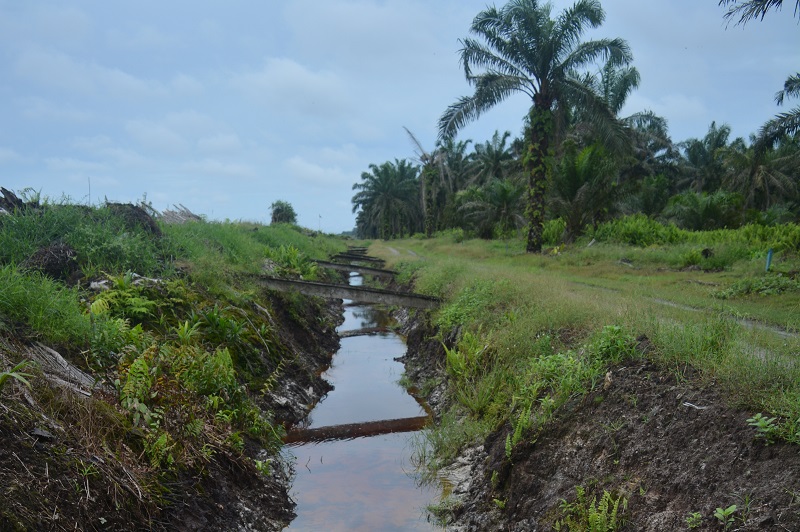
Drainage canal in an oil palm plantation near Semanga
But the river began to change when palm oil plantations arrived in the late 1990s, and life for the people of Semanga has changed with it. Earlier this year I visited Semanga with our local partner organisations Ecoton and Gemawan. The stories I heard were both heartbreaking and inspiring.
Palm oil plantations have become infamous for their environmental and social impacts, but still relatively little is known about the impacts of palm oil plantations on local water supplies and watersheds. This is why Both ENDS is working together with partners in two districts in West Kalimantan to support local communities to understand the impacts of surrounding palm oil plantations on their rivers, water sources, health and livelihoods. In Semanga, Ecoton and Gemawan are working with women to identify and map river contamination under a research and advocacy project jointly supported by ELSAM.
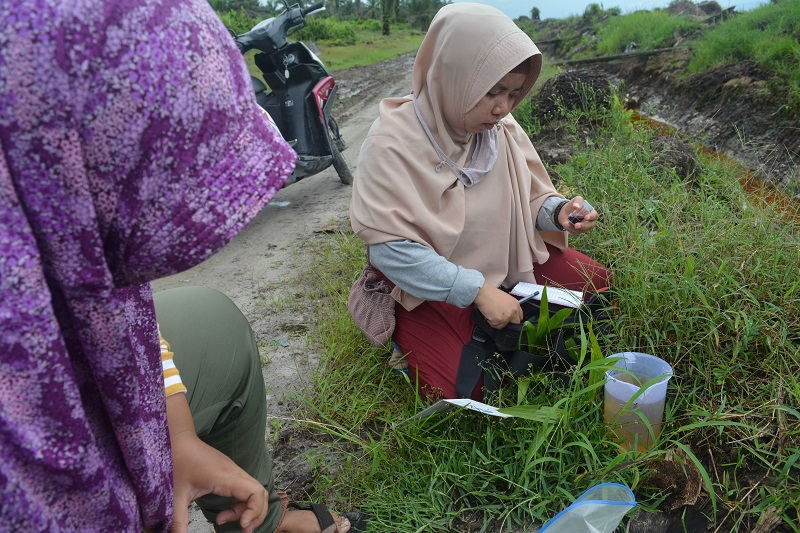
Members of the village women's group testing drainage canal water for chemical pesticide and fertilizer contamination.
"We know the river is sick."
The people in Semanga know the river is sick with pollution. The Sambas River and its tributaries that flow past the plantations previously provided shelter and breeding grounds for many fish species. The river was known for its giant freshwater shrimp. Now the waters are chocked with toxic run-off from the plantations and palm oil mills upstream. There are very few fish and many fish species have disappeared, including several from the IUCN's Red List of Threatened Species. It's been years since a giant shrimp has been seen in Semanga.
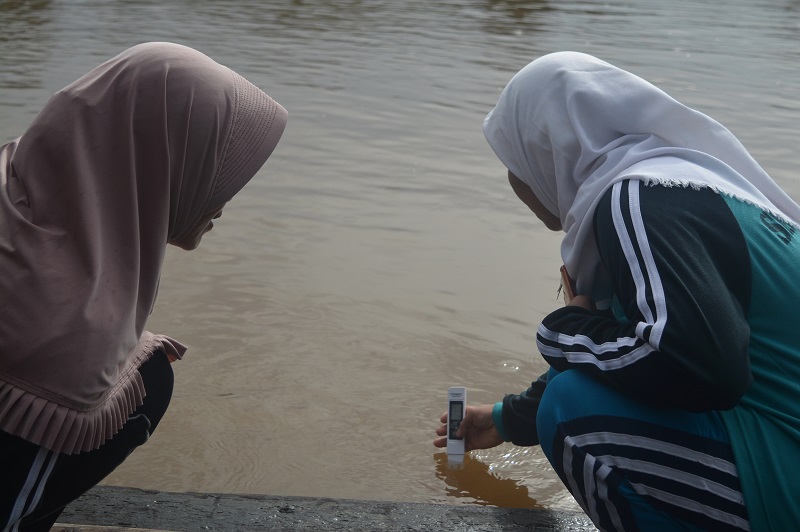
Two members of the Semanga women's group test the level of heavy metals in the surface flow of the Sambas River
'Fisherman' is no longer a feasible occupation in Semanga.
So, many villagers now rely on their small plots of rubber trees and labouring on the plantation for their livelihood. Both are extremely hard work, with men and women travelling to their rubber plots at around 3am every day before the hot sun rises, to tap rubber in the dark. At 7am they return home for breakfast and to see their children, before heading to the plantation to labour until the early afternoon.
Women bear the brunt of these impacts, as they must also tend to household duties like washing, cleaning and cooking, and looking after their children. Women also work as 'sprayers' on the plantations – labourers that spray pesticide and herbicide and spread fertilizer, as men are employed to do the heavy lifting; harvesting bunches of fruit from the tall palms and loading them onto trucks for transport to nearby mills. Sprayers are rarely provided with adequate safety equipment and, unsurprisingly, many also suffer chronic health issues related to long-term exposure to dangerous chemicals.
"The river is smelly and leaves an oily feeling on your skin that can't be washed off."
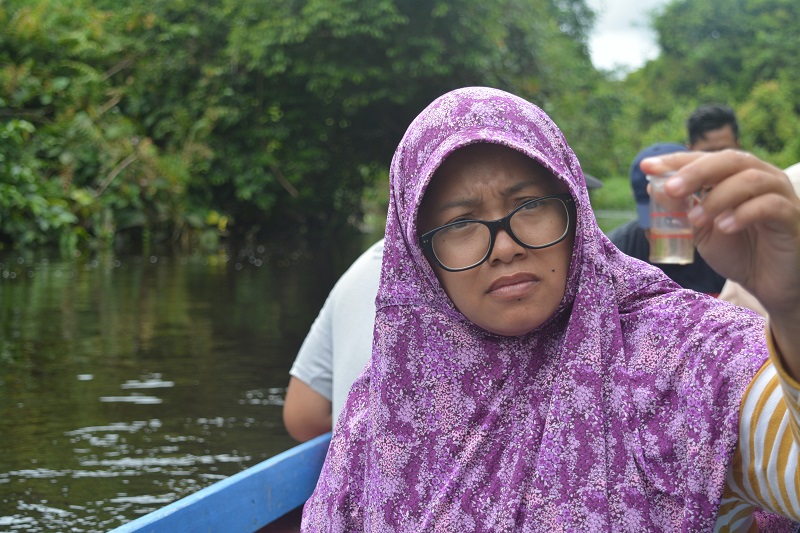
Riska Darmawanti of Ecoton testing water in a Sambas River tributary
And there are more problems. Now that the river is too polluted to drink, each family must collect rainwater during the rainy season. When their water supplies run out in the dry season, they must buy drinking water at the nearest town or collect water from upstream springs. Given clean water is scarce and expensive, all families still wash and bathe in the river, and their health is suffering. Everyone in Semanga suffers from skin irritations; a red itchiness that doesn't go away, and a greasy feeling that doesn't wash off. This especially effects children, who like to swim and play in the river, and especially during the dry season when the river water is low and level of contamination is higher. I ask the women how the people in the community can tolerate the itchiness and irritation. They answer simply that this is 'the new normal' in Semanga – people have no other choice but to accept it.
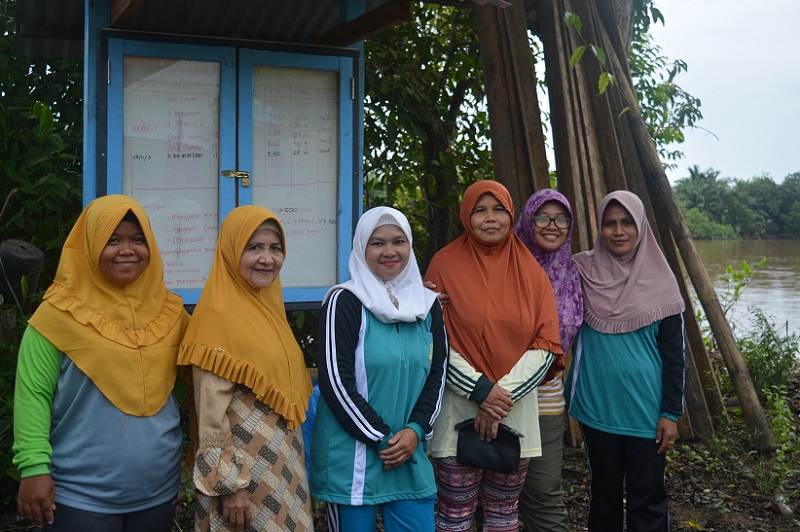
Members of the KUMPAI women's group in front of the community notice board where they record their test results.
To help the community map and understand the connection between the plantations, the river, the fish stock and their health, Ecoton, Gemawan and ELSAM are training a group of local women to test the river water for various contaminants and to communicate the results and implications to the rest of the community. The women, who call their group "KUMPAI" after a giant grass that grows in abundance in the shallow waters of the river, update a notice board in the community with their results. They use indicators like PH, heavy metals, solid matter and bacteria to track the health of the river. They also speak with women who work on the plantations about the kinds of pesticides, herbicides and fertilizers they use, what safety equipment they are given, and whether they suffer any health issues.
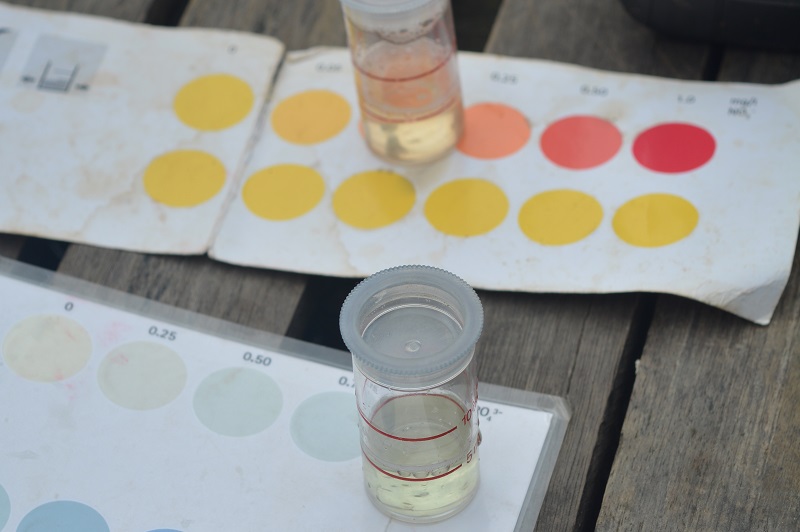
Water samples can be assessed with the use of these simple tools
It is hoped that linking the pollution in the river to the chemicals used on the plantations will open doors for the community to start discussing possible solutions with local authorities and political representatives.
However, the KUMPAI women are worried that if they raise their concerns about the pollution in the river, other community members will not support them, especially if they implicate the palm oil plantations where many people in the village now work and rely on for their income. The Semanga community is caught in a cruel trap suffered by countless other communities in palm oil plantation areas – after the plantations destroy their livelihood, they have little choice but to work on those same plantations to survive.
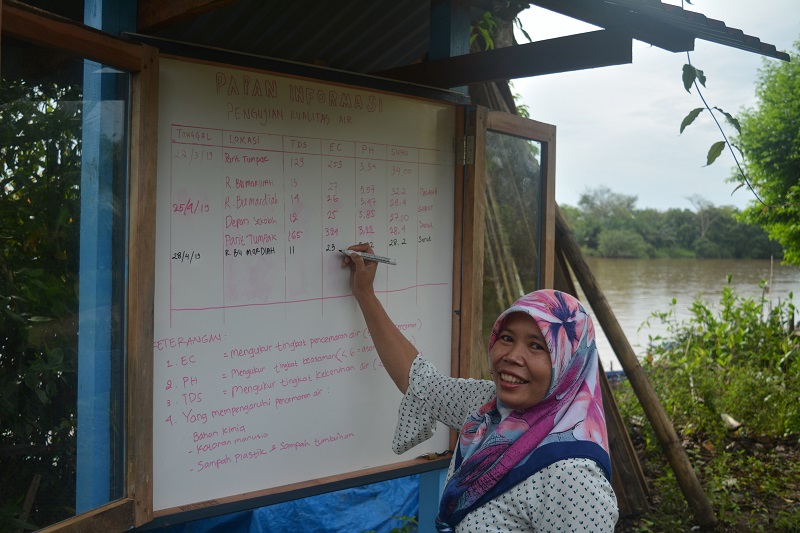 A member of KUMPAI updates the public notice board with today's results.
A member of KUMPAI updates the public notice board with today's results.
Nevertheless, the KUMPAI women are leading by example and raising awareness in the community about pollution, health, hygiene, sanitation and waste management issues. Slowly they are building support within the community and momentum to tackle the river pollution and the powerful plantation companies behind it. Their stories are inspiring others – including me – to have hope that another 'new normal' is possible in Semanga, where the community is united around a healthy river brimming once again with life.
"The pollution needs to be stopped somewhere and it can start with me."
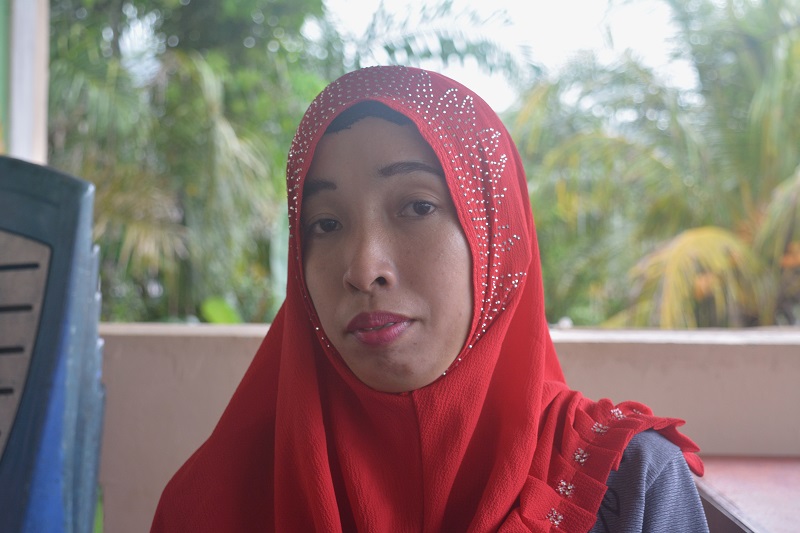 Atika, a member of the KUMPAI women's group
Atika, a member of the KUMPAI women's group
"I joined KUMPAI because I was curious about what was happening and I hoped I would learn new skills. I feel responsible to help the river because it is now so polluted by the oil palm plantations and other waste. I wanted to act, but wasn't sure what I could do. My husband used to be a fisherman but his livelihood has been ruined. Now he travels to Sanggau [about 600km away] each year to help with the honey harvest. When he is in Semanga he lays fish traps every three days but the catch is so small it cannot support our family. During the dry season there are no fish at all.
The pollution needs to be stopped somewhere and it can start with me. I hope to see the fish return and that people will stop throwing their garbage into the river. Being part of KUMPAI is key to achieving that."
"I hope the next generation will be able to use the river again like we did as children"
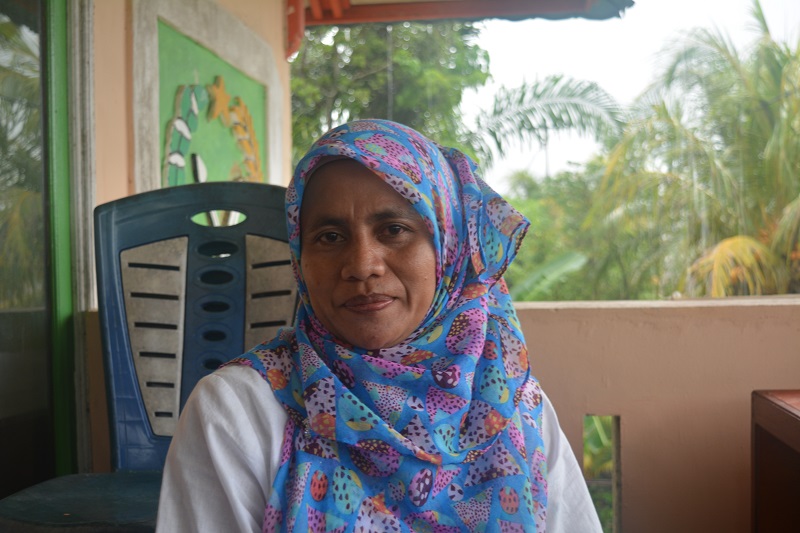 Siti Hajar, a member of the KUMPAI women's group
Siti Hajar, a member of the KUMPAI women's group
"I like to try new things and be involved in community life, so I agreed to be involved in KUMPAI when I heard the group would have a focus on the river. The river is a source of life, so the health of the river is important for me. Before the palm oil plantations arrived, we used the river for drinking and cooking, but now it can't be used because it's not safe. Now sometimes when we bathe there is a yellow colour in the water that we can't wash off with soap. We all suffer itchy skin in the dry season. I hope the next generation will be able to use the river again like we did as children."
"I'm worried about my children's health and the future of all children in the village. I decided to do something about it"
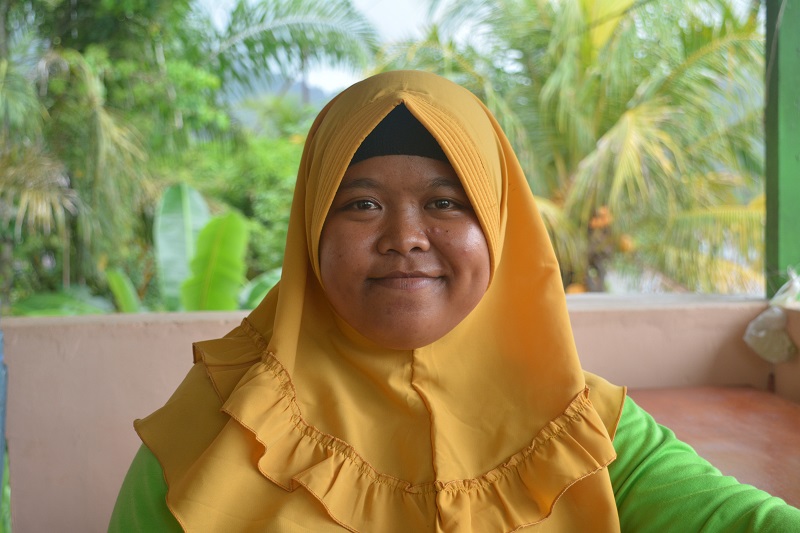 Irriyanti, a member of the KUMPAI women's group
Irriyanti, a member of the KUMPAI women's group
"My family's livelihood depends on the river, I wash my clothes in the river, I bathe my children in the river and we all used to drink from the river. Since joining KUMPAI I've become very conscious of the river pollution and my own waste. I see families throwing their rubbish and children's diapers in the river. I'm worried about my children's health and the future of all children in the village. I decided to do something about it, so I bought washable nappies from the city and introduced them in in the village. Now I sell them here. I hope to convince all women in Semanga to use washable nappies so that soon there won't be any diapers floating in the river anymore."
The activities of ELSAM, Ecoton and Gemawan receive support from the Fair Green and Global Alliance (FGG) and the Global Alliance for Green and Gender Action (GAGGA).
Read more about this subject
-
 Dossier /
Dossier /Global Alliance for Green and Gender Action (GAGGA)
GAGGA rallies the collective power of the women's rights and environmental justice movements to realize a world where women can and do access…
-
 External link / 19 June 2020
External link / 19 June 2020Women and water in the shadow of oil palm plantations (Annual Report 2019)
In 2019, women from Semanga, Indonesia took action to improve the water quality in their community affected by palm oil. "The pollution needs to be…
-
 News / 2 July 2019
News / 2 July 2019Indonesia: Women’s Right to Water
The water quality of East Java's largest river, the Brantas River, is increasingly deteriorating due to a combination of industrial and household waste. This environmental pollution has a disproportionate impact on women. Yet, their participation in decision-making remains lacking. ECOTON is working to…
-
 Blog / 5 October 2018
Blog / 5 October 2018ECOTON (or the rollercoaster of Surabaya)
From the first moment I arrive in Surabaya, I enter the rollercoaster called ECOTON. I'm visiting them to get to know the work of this long-time Both ENDS partner, and have only three days for this. But ECOTON does a lot, and all of it at the same time. Tirelessly, they work on the protection of the…
-
 Event / 23 March 2023, 13:15 - 14:30
Event / 23 March 2023, 13:15 - 14:30Making finance for gender just water and climate solutions a reality!
The UN Water Conference is an important event that brings together stakeholders from around the world to discuss water and climate solutions. This year, GAGGA is organizing a side event during the conference that you won't want to miss!
On Thursday March 23rd, from 1.15 -2.30 pm, GAGGA will present their commitment to support, finance, and promote locally rooted, gender just climate and water solutions within the Water Action Agenda. This event will inspire other stakeholders to join in their commitment, while presenting…
-
Publication / 15 March 2023
-
 News / 23 March 2020
News / 23 March 2020Women in Latin America claim their right to water
In many places in Latin America, access to clean water is under great pressure from overuse and pollution, often caused by large-scale agriculture or mining. This has significant impact, especially on women. In March, with International Women's Day on March 8 and World Water Day on March 22…
-
Publication / 8 January 2021
-
 Transformative Practice /
Transformative Practice /A Negotiated Approach for Inclusive Water Governance
A Negotiated Approach envisages the meaningful and long-term participation of communities in all aspects of managing the water and other natural resources on which their lives depend. It seeks to achieve healthy ecosystems and equitable sharing of benefits among all stakeholders within a river…
-
 News / 22 June 2017
News / 22 June 2017Demonstrating for environmental and human rights in Guatemala
On June 5th, World Environment Day, community members at the southern coast of Guatemala protested against the rapid spread of large-scale palm…
-
Publication / 2 November 2021
-
Publication / 8 March 2018
-
 Blog / 29 January 2018
Blog / 29 January 2018Indigenous leader tells about aching nine year palm oil conflict
Pak Japin is a quiet, slim, and softly-spoken man from the village of Silat Hulu, West Kalimantan, Indonesia. I met him at a recent documentary screening in Bali on the fringe of the Round Table for Sustainable Palm Oil (RSPO) annual conference, where he spoke about his community's nine year-long…
-
Publication / 19 April 2016
-
 News / 8 March 2019
News / 8 March 2019Campaign "We, women are water" launched on International Women's Day
During the month of March, and as part of International Women's Day (March 8th) and World Water Day (March 22nd), the organizations that…
-
 News / 18 December 2017
News / 18 December 2017Communities take Guatemala to court for water rights abuses
Last month, our partner Utz Che' filed a lawsuit against the Guatemalan state on behalf of some communities along the Madre Vieja River. The communities demand, among other things, that their right to water is respected and that they are protected against water abuse and pollution by…
-
Publication / 16 October 2023
-
 Video / 12 September 2018
Video / 12 September 2018Water defenders
Latin American partner organizations of GAGGA launched the campaign "We, women, are water" in March 2018. This video was launched as part of…
-
 Video / 12 September 2018
Video / 12 September 2018Water is a common good
The Latin American partner organizations of GAGGA launched the campaign "We, women, are water" in March 2018. This video was launched as part…
-
 Video / 12 September 2018
Video / 12 September 2018Women are water
Latin American partner organizations of GAGGA launched the campaign "We, women, are water" in March 2018. This video was launched as part of…





















